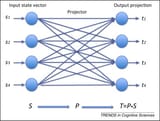>>16697475 (OP)The point of Grad school is that you come up with your own project. well, being hard working doesn't necessarily translate into creativity. you could develop and FPAA or QBit co-processor. It could be interesting, but a lot of work.
Then with a FPAA or QBit co-processor, you could do many interesting things. A field programmable analog array could be conceptually simpler to implement, but the tuning would be tedious. You could try to use a small number of qbits to maintain a large analog array.
why do either of these?
Digital electronics are inefficient in doing AI research. At some-point, no more efficient or clever algorithm will increase the operational intelligence of a system. For example:
it takes thousands of transistors to integrate e^(x) in a digital binary configuration.
where the same calculation can be done with 1 transistor in an analog configuration.
all these neural nets end up doing is some integration with weights and biases, but the complexity is absurd, and it doesn't need to be that way. Just analog electronics weren't as advanced and the means of processing large sets of analog values were not available when digital electronics came around.
I cant predict what your peers will say, but if you invent a product that improves AI efficiency by even 10% you'll be a millionaire, and colleges rarely have shit to say to those folks. ... outside of please give us funding.
